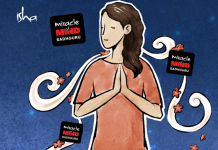
Hormones are not always about puberty, adolescence, or about birth control. Hormones go way beyond reproductive organs; they’re like the messenger of your body. Each hormone sends specific instructions to every organ and helps determine your mood, energy levels, weight, temperature, digestion, and many other aspects of your health. Hormones have an especially large impact on energy, and chronic fatigue sufferers have been shown to often have hormonal deficiencies.
So, it’s probably not your stressful work that makes you feel extremely exhausted midday. It’s probably not the hours you spent on traffic jam that make you fall asleep as soon as you rest your head on your pillow. It could be the hormonal imbalance.
Here we explain how your hormones could be making you more tired than usual.
When you feel tired after facing an emotional crisis: cortisol
Cortisol (often referred as “stress hormone”) plays a role in maintaining and regulating homeostasis (your body’s balanced response to anxiety-provoking situations). Cortisol is interconnected to tiredness there is a disorder called adrenal fatigue, which is characterized by high levels of cortisol during a physical or emotional crisis, and extremely low energy afterwards. Adrenal fatigue is a dysfunction of your brain’s communication with your adrenals, not the adrenal glands themselves; so the solution to this problem focuses on minimizing chronic stressors.
When you’re feeling sluggish: Thyroid
Every cell of your body needs thyroid hormones to function healthily. Hypothiroidism is when your body produces too little of thyroid hormones, while hyperthyroidism is when your body produces too much of these hormones. Imbalanced thyroid level could make you feel tired, infrequent bowel movements, and mental sluggishness. Maintaining your hormonal health is the key to maintaining your overall wellness, both physically and mentally.
When you have a chronic fatigue: Estrogen
Estrogen refers to a group of hormones (estrone, estradiol, and estriol) that are crucial to reproductive health. Estrogen levels are directly connected to endometriosis, and estrogen dominance plays a critical role in the development of Polycystic Ovary Syndrome (PCOS)—it’s no surprise that one of the most common symptoms of both these reproductive health issues is fatigue. Estrogen imbalance on male can also experience chronic fatigue due to imbalanced estrogen level.
When you’re feeling sick, fatigued, and hungry all the time: Leptin
Leptin sends signals to your body when you need to store or burn extra fat. If the hormone is not being secreted correctly due to anything from chronic emotional distress to chemical imbalances in your hypothalamus, you could form leptin resistance: a disorder that prevents you from producing the hormone, and leaves you feeling sick, fatigued, and hungry all the time; despite how much you eat or sleep. Without healthy production of this hormone, you can easily get caught in a cycle of mental health issues that trigger physical issues. Increase your daily vegetable intake and make an effort to be active a little bit each day to improve leptin production.
When you are tired but cannot sleep at night: Melatonin
Melatonin is secreted from the pineal gland, and helps maintain your body’s circadian rhythm: the 24-hour, internal clock all living things posses that tells you when to eat, sleep, and be active. Although melatonin is not the essential hormone for sleep, humans are shown to sleep better when it is secreted. So, when you can’t sleep at night and waking up late the next morning, it’s probably because this hormone is out of balance for you. You can increase your natural production of melatonin by doing things like decreasing artificial light at night and taking a hot bath.




